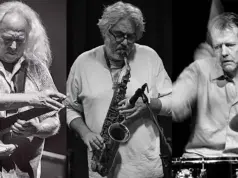

Note from the Editor: This article originally ran in the Troy Record on September 21, 1995, by current Nippertown author, Don Wilcock. This comes from Don’s extensive archive of interviews and we thought it was appropriate to share it as we all hoping for a speedy recovery for John Prine.
Note from the Author: I’m hopeful that this great American songwriter will overcome the coronavirus. Be reminded that this article is 25 years old, and his subsequent career and personal life have changed dramatically. Today, he is universally loved and his legacy rightfully continues to grow.
John Prine folk rocks Hall into new season
John Prine – who opens The Troy Savings Bank Music Hall’s ’95 –’96 season tomorrow night – is the kind of romantic whom women love until they get to know him and realize he can’t be pinned down. For 24 years he’s been a critic’s darling, dangling in the never-neverland between folk and rock.
He sings about love without commitment and romantic memories thrown together with images of bloody violence.
Nuggets of profundity lie hidden among the clutter of the very ordinary. It’s as if he put three random ideas into a blender and spilled the overflow across the counter.’ Compared to Dylan when he released his first record in 1971, Prine slipped that albatross from around his neck by doggedly continuing to release records even though they didn’t sell.
He looks at the 11 albums he’s put out as “little advertisements” for the concerts. “But if my refrigerator breaks down,” he explains,” I go to Kansas City and play for two hours to pay for it.”
Lost Dogs and Mixed Blessings,” his latest CD, contains a song “All The Way With You” with the lyric: “Don’t know where we’re coming from/Or where we’re going to/Can I go all the way with you?”
That seems to sum up his life story. His biggest kick in life is standing up in front of people who actually pay money to sit and listen to him “sing out of tune, tell jokes and scratch my head. I can’t believe I’m standing up there, and they’re looking at me. You know? It’s a kick.”
When the Army gave him an aptitude test, he filled in the answer book without ever looking at the questions. “They ran it through the computer and said, “This kid is a mechanical genius” and put me in charge of the motor pool.
“I had a monkey wrench that was about a mile long, working on bulldozers and cranes. I mean, the nuts and bolts were bigger than a pay phone. It was all because I didn’t open that question book.”
He worked for a while in the post office without ever randomly opening fire on his co-workers. Then, in 1981, out of the blue, Atlantic Records’ Jerry Wexler offered him a recording contract.
I was numb,” says Prine. “Really! I’d never been to New York. Steve Goodman and I had been in town 12 hours, and getting record companies offering us contracts was pretty heady, you know?”
Five years later, with six LPs left to go on his contract, Prine bought his way out of his major label contract.

“I just went, ‘That’s it!’ I went to see (Atlantic CEO) Ahmet Ertugun and told him ’cause he was pretty busy with Led Zeppelin and the Stones. I just said, ‘I just don’t think I really fit in over here. I’d like to take off.’ So, he sent me a bill.”
After five years with Asylum, Prine gave up on the corporate label world altogether and has produced albums including his Grammy winner, The Missing Years, under his own label affiliation, Oh Boy Records.
“I ain’t got nuthin’ against those people (major labels) he insists. “I just don’t want to work for a major corporation. To me it’s totally incongruent with being an artist. I just decided not do it regardless of what the consequences would be.
“And it turns out I couldn’t have done a better thing. It’s been great for my head, and it’s been great for business. Now, we’re got the same distribution. We’re on a major, except I get almost 50 percent of what the record costs as opposed to two or four cents record.”
Prine is best known as the writer of “Angel from Montgomery” which Bonnie Raitt made into a hit, and for “Hello In There” as performed by Bette Midler.
“I have been in love with Bonnie for 25 years,” admits Prine. The first time he heard Bonnie sing “Angel from Montgomery” was at a festival he can’t remember where. “We used to travel around together. We’d go to festivals together where we weren’t even on the bill.”
Marianne Faithful, the winsome teenager for whom Mick Jagger wrote “As Tears Go By” in 1963, duets with Prine who is also a fan of her work, particularly her mid-’80s ode to self-destruction, “Broken English.”
“She said she played “The Missing Years” a whole lot when she was writing (her autobiography). She said “All The Best” was her song and Mick Jagger’s song.”
The lyrics from that Prine song that best fit Faithful and Jagger, quips Prine, are “I wish you wouldn’t do like I do/And never fall in love with someone like you.”
Some of Prine’s music sounds like Jimmy Buffett in shorts with a Pina colada in hand. Others are straight acoustic folk.
But his best stuff has a kind of shaggy dog, rock quality to it that’s typical of the heavy backup musicians working with him on this album. Waddy Wachtel (who has worked with everyone from Linda Ronstadt to James Taylor) and Benmont Tench of Tom Petty’s Heartbreakers.

This style, he says comes from learning to play guitar from his brother who was into folk legends The Carter Family and Elizabeth (“Freight Train”) Cotton.
“If I had a different guitar teacher, I might be playing different music,” he says. “I do know as soon as I learned three chords and started playing, I started making up songs right away. It was something that came real natural to me.”
Now that there’s adult alternative album radio, there is actually format that Prine’s music fits into, and he’s heard his own music played on the car radio as he’s heading out to the store to buy milk.
He’s also working on his third marriage. But both marriages and record sales are something you can’t count on from this maverick whose latest liner sleeve photo shows him whistling in a graveyard.
“Maybe I just don’t know how to make stuff bad enough to sell,” he says, dismissing the concept of commercial success.








